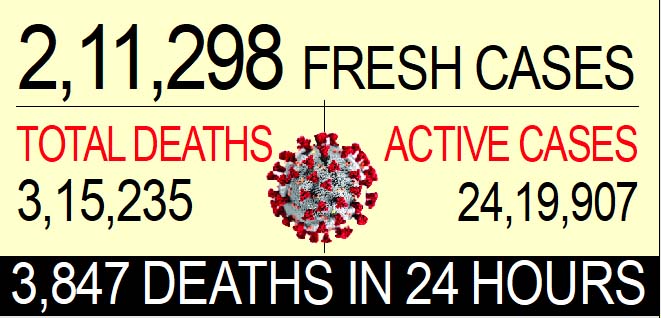
New Delhi, May 27
Faced with acute Covid vaccine shortage, India on Thursday altogether waived the requirement of local trials for leading foreign vaccines to facilitate imports of Pfizer, Moderna and J&J jabs.
Edit: Cover priority groups

The decision comes after the April move whereby the government had said vaccines approved by the drug regulators of the US, UK, EU, Japan and those in the WHO emergency use listing would be granted approvals in India without the need for prior bridging trials.
‘No word from WHO on vaccinating kids’
- After Delhi CM Arvind Kejriwal demanded Pfizer vaccines for children, the Centre said the WHO had no recommendation on vaccinating children.
- Trials for children in India are to begin soon, the government stated.
Not off-the-shelf items, explains union Govt
Buying vax internationally is not similar to buying ‘off-the-shelf’ items. Vaccines are in limited supply globally, and companies give preference to countries of origin. The Centre
Ramping up domestic production
Bharat Biotech to enhance monthly manufacturing capacity from 90 lakh doses to 10 cr by October
Continue with Covid norms till June-end, states told
These vaccines were, however, mandated to undergo post-approval parallel bridging clinical trials in India – a provision the government dropped today.
None of the foreign firms has applied for licensure with the Indian regulator yet.
VK Paul, chairman of the national Covid vaccine taskforce, said Pfizer vaccine import was likely from July and talks were underway after the firm indicated the availability of jabs for India. Admitting that Pfizer had sought indemnity from compensation in cases of serious adverse events among Indians, Paul said, “The matter is being examined. No decision has been taken yet.”
The government also said foreign vaccines were not available in free supply.
“Covid vaccines of Zydus Cadila, Biological E and Gennova are in the pipeline,” Paul said as India witnessed 3,847 deaths today, though the daily cases continued to fall for the 20th day – from 4,14,188 on May 7 to 2,11,298 today and active cases saw a 35% drop from the May 10 peak (37 lakh to 24.19 lakh).
The government also released “myths and facts” about vaccines, ruling out compulsory licensing as an unattractive option.
It rejected accusations of not helping the states and said the failure of states to procure directly from firms reaffirmed what the Centre had been saying all along – that vaccines were in short supply globally. — TNS